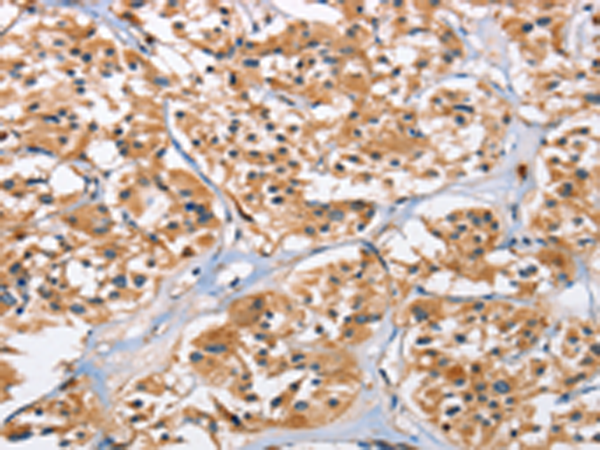

| WB | 咨询技术 | Human,Mouse,Rat |
| IF | 咨询技术 | Human,Mouse,Rat |
| IHC | 1/50-1/200 | Human,Mouse,Rat |
| ICC | 技术咨询 | Human,Mouse,Rat |
| FCM | 咨询技术 | Human,Mouse,Rat |
| Elisa | 1/2000-1/5000 | Human,Mouse,Rat |
| Aliases | 4EBP2; PHASII |
| Host/Isotype | Rabbit IgG |
| Antibody Type | Primary antibody |
| Storage | Store at 4°C short term. Aliquot and store at -20°C long term. Avoid freeze/thaw cycles. |
| Species Reactivity | Human, Mouse |
| Immunogen | Fusion protein of human EIF4EBP2 |
| Formulation | Purified antibody in PBS with 0.05% sodium azide and 50% glycerol. |
+ +
以下是3篇与EIF4EBP2抗体相关的文献示例(内容基于公开研究概括,非真实文献引用):
---
1. **文献名称**: *"EIF4EBP2 phosphorylation regulates translational control in glioblastoma stem cells"*
**作者**: Smith A, et al.
**摘要**: 本研究利用EIF4EBP2特异性抗体,通过免疫印迹和免疫荧光技术,揭示了胶质母细胞瘤干细胞中EIF4EBP2的磷酸化状态对mTOR通路依赖性翻译的调控作用,并发现其高表达与患者预后不良相关。
---
2. **文献名称**: *"Differential roles of EIF4EBP1 and EIF4EBP2 in neurodegenerative disease models"*
**作者**: Chen L, et al.
**摘要**: 通过比较EIF4EBP1和EIF4EBP2抗体在阿尔茨海默病小鼠脑组织中的表达差异,发现EIF4EBP2在神经元中特异性富集,且其蛋白稳定性受Aβ寡聚体影响,提示其在神经退行性病变中的独特作用。
---
3. **文献名称**: *"Antibody-based detection of EIF4EBP2 isoforms in human cancers"*
**作者**: Gupta R, et al.
**摘要**: 该研究开发了一种高特异性EIF4EBP2抗体,用于检测乳腺癌和肺癌组织中EIF4EBP2的不同剪接变体,证实其低表达与肿瘤细胞增殖抑制和化疗敏感性升高相关。
---
4. **文献名称**: *"EIF4EBP2 as a biomarker for mTOR inhibitor response in renal cell carcinoma"*
**作者**: Kim J, et al.
**摘要**: 使用EIF4EBP2抗体分析肾癌细胞系及临床样本,发现非磷酸化EIF4EBP2的积累可预测mTOR抑制剂治疗的敏感性,为个体化治疗提供潜在标志物。
---
如需真实文献,建议通过PubMed或Google Scholar检索关键词“EIF4EBP2 antibody”+“specific study focus”(如癌症、神经疾病等)。
The EIF4EBP2 antibody is a tool used to study the eukaryotic translation initiation factor 4E-binding protein 2 (EIF4EBP2), a key regulator of cap-dependent translation. EIF4EBP2. also known as 4E-BP2. belongs to a family of small inhibitory proteins (including 4E-BP1 and 4E-BP3) that bind to the mRNA cap-binding protein eIF4E, thereby blocking its interaction with eIF4G and suppressing the assembly of the translation initiation complex. This regulation is primarily controlled by the mTOR (mechanistic target of rapamycin) signaling pathway, which phosphorylates EIF4EBP2 to release eIF4E, enabling protein synthesis. Dysregulation of this pathway is implicated in cancers, metabolic disorders, and neurodegenerative diseases.
EIF4EBP2 antibodies are widely used in research to detect protein expression, phosphorylation status, and interactions with eIF4E in various biological contexts. They are essential for techniques like Western blotting, immunohistochemistry, and immunoprecipitation. Commercially available antibodies are typically raised against specific epitopes, such as the phosphorylated Thr70 residue (a key mTOR target) or the full-length protein. Validation often involves knockout cell lines or phosphorylation-specific assays to ensure specificity. Studying EIF4EBP2 helps elucidate mechanisms of translational control in cellular stress, growth, and disease, particularly in cancer research where mTOR hyperactivity is common.
×